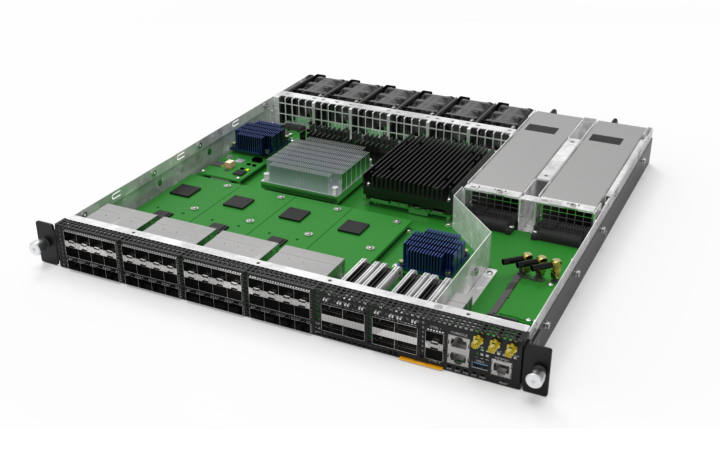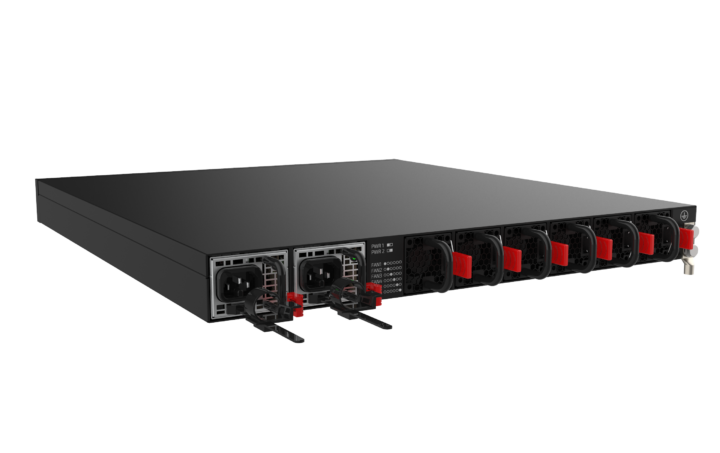APS Networks launches three TIP OpenBNG programmable switches
APS Networks launches three TIP OpenBNG programmable switches to boost the disaggregated telco broadband market.
Operators gain further product alternatives right down to the chip level, supporting multi-sourcing strategies for Broadband Network Gateway (BNG) and hybrid use case requirements. The APS Networks OpenBNG devices are based on Intel Tofino P4-programmable Ethernet switch ASICs, Stratix 10 MX FPGAs and Intel Xeon D Scalable processors.
APS Networks launches three BNG switches which aim to comply with the Telecom Infra Project’s (TIP) OpenBNG requirements, enabling customers to choose between the TIP standard configurations (SC) SC-1, SC-2 and SC-3 leaf designs that best address end user demands. This provides operators flexible deployment options covering full-functionality deployments and service-only BNG deployments and leaf-spine configuration alternatives.
TIP OpenBNG is an initiative within the Open Optical & Packet Transport (OOPT) Project Group’s Disaggregated Open Routers (DOR) sub-group. The participating operators in the Project Group are currently preparing a joint Request for Information (RFI) for OpenBNG, leading to test and validation activities and the awarding of TIP badges later in the year for compliant solutions. The OpenBNG initiative is backed by leading operators such as BT, Deutsche Telekom, Telecom Italia, Telefónica and Vodafone Group.
Disaggregated and open BNGs allow operators a choice of different hardware platforms and types of network operating system (NOS) and control plane applications they want to use. This agility results in a lower total cost of ownership, ultimately leading to a lower cost per broadband subscriber and reduces dependencies on individual monolithic suppliers. Disaggregation provides any user with more flexibility in services offerings and enhanced experiences, allowing organizations to easily adapt to ever-changing business requirements.
APS Networks is a member of Broadband Forum, the leading open standards organization, that is increasing the scalability of operators’ networks by creating a simplified and more agile architecture to address the increased bandwidth demands being placed on BNGs due to the growth of broadband demand and video consumption across devices. Broadband Forum’s ‘Control and User Plane Separation for a Disaggregated BNG’ (TR-459) outlines the challenges in control plane and user plane scaling. This architecture reduces time to market for new services and simplifies network operation by reducing the number of management points.
APS Networks is launching the following three BNG switch designs: The Hyperion APS2172Q, supporting 64×1/10/25G BNG user ports & 8x100G spine ports (SC-1), the Jupiter APS6120Q with 16x100G BNG ports & 4×1/10/25G ports (SC-2) and the Hyperion APS2140D with 32×1/10/25G BNG user ports & 8x100G spine ports (SC-3 leaf). The APS2172Q and APS6120Q support up to 32,000 broadband subscribers and the APS2140D up to 20,000 broadband subscribers.
The announced Advanced Programmable Switches (APS®) by APS Networks make use of the Intel Tofino P4-programmable Ethernet switch ASICs, Intel Stratix 10 MX FPGAs with High-Bandwidth Memory (HBM), and MoSys® Blazar high-speed memories to allow for up to 7 layers of Hierarchical Quality of Service (HQoS) and buffer capabilities. The units feature Intel Xeon D processors, which provide high-speed connectivity between the compute board and switch board and include innovative hardware-enhanced security features.
All models can be equipped with a versatile Precision Time Protocol IEEE 1588v2 compliant add-on module, which enables the switches to operate as PTP boundary clocks. The PTP module has been designed by Oregano Systems, a MEINBERG® company, and supports a wide range of PTP profiles and features. It integrates a dedicated high-performance PTP hardware-processor and a high-quality OCXO into the new APS Networks OpenBNG product line, allowing to build a highly interoperable and powerful synchronization infrastructure for a multitude of applications and use-cases. The PTP module will deliver end2end accuracies of less than 10ns.
Expanding upon the need for greater data and privacy protections, special attention was given to the overall security of the devices, strictly following the principles of ‘Security by Design’ with focus on a secure supply chain from design to production and enhanced security features on both hardware and software. Telco networks typically form part of a country’s Critical National Infrastructure (CNI), making enhanced security mandatory.
The entirely new switch range comes with core software, including the lightweight and secure Yocto-based core OS mion, which falls under the Network Grade Linux Project by the Linux Foundation. The switches support OpenBMC and Redfish, boosted with further security features and use the Open Networking Foundation’s (ONF) Stratum project to standardize north-bound APIs, making it easy for NOS vendors to port to the devices by using open standards.
The APS Networks OpenBNG products support a range of commercial NOS options and an open source-based options making use of the ONF’s Tassen, SD-BNG and Aether projects.
Availability: The APS2140D and APS6120Q are scheduled to be available from Q4 2021 as early access and the APS2172Q from Q1 2022. APS Networks is taking orders from customers and partners interested in being part of our Early Access Program.





